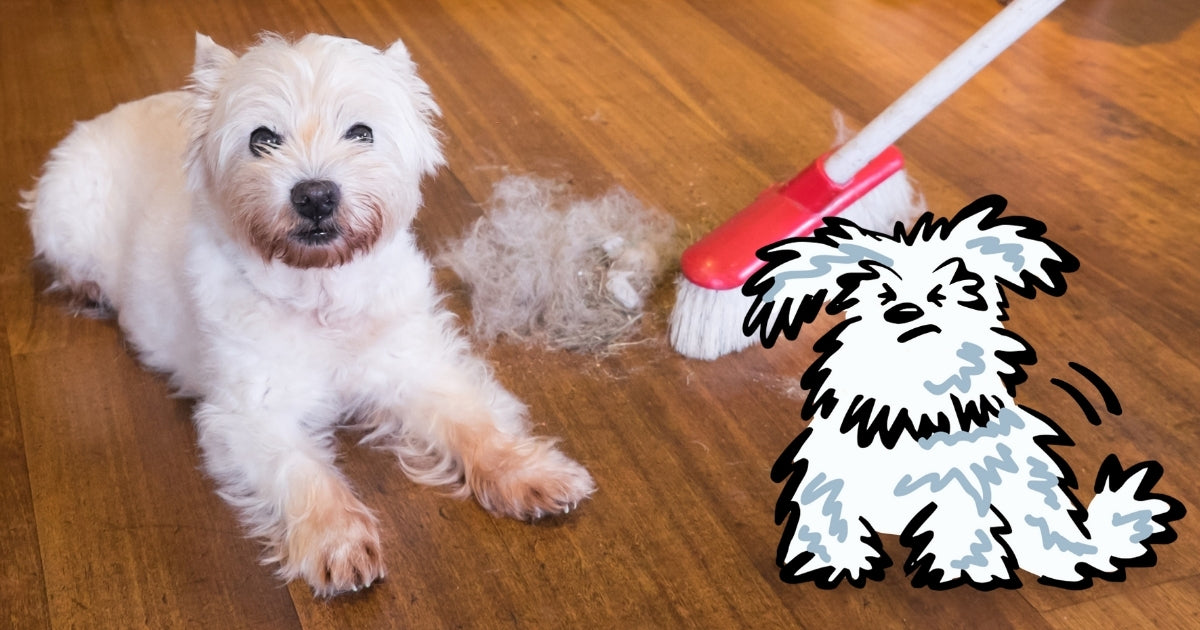
Fish Oil for Dogs: Does It Help with Shedding?
March 01, 2024Contents
- What Is Dog Shedding?
- The Importance of Dogs Having Healthy Skin and Good Coat Health Condition
- Roles of your dog's coat and skin in your pet's health
- Dog's skin and pet hair serve as security
- They work to protect their immunity
- They serve as thermoregulation
- They help in hydration
- They serve as storage for needed nutrients
- What Causes Dog's Excessive Shedding?
- Is Shedding Painful for Dogs?
- What Are the Benefits of Giving Salmon Oil to Help Dogs Have a Healthy Hair/Coat?
- What Can You Learn From This Article?
Dog's breed, the point of the year, and the type of weather are three of the factors that you need to be aware of if your dog starts shedding. This happens if your dog has damaged fur and they need to make room for new strands. Seeing this happen is inevitable; dog shedding will happen to your fur babies. However, it can be constant, seasonal, or too subtle that you do not even notice this at all. Fish oil for dogs consists of essential omega 3 fatty acids will help support healthy skin and coats.
Let us break down everything there is know about the benefits of fish oil in fog shedding, normal shedding, hair loss, etc. Plus extra juicy bits about men's best friend.
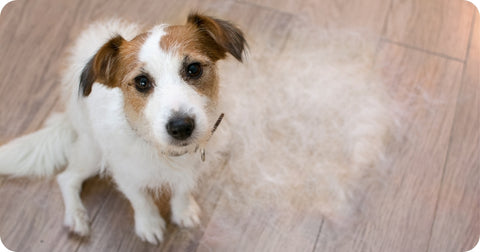
What Is Dog Shedding?
If these gadgets or products are familiar to you, chances are you have dogs at home that naturally shed coat, and you use either a pet hair vacuum, lint roller, or undercoat rake to clean up and stage your house again for more shedding—just kidding.
As mentioned above, shedding is when your dogs need to exfoliate to welcome a new coat. It would be best to watch out for excessive shedding, where you will notice a bit of skin irritation, as this suggests they may be another condition requiring medical attention.
The Importance of Dogs Having Healthy Skin and Good Coat Health Condition
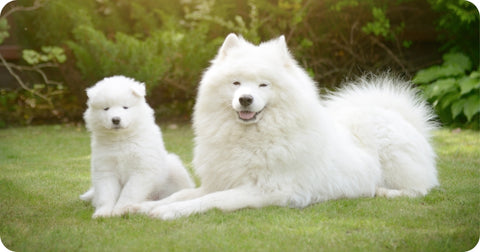
Healthy dogs have a lustrous coat; health is undeniably in great shape. However, those fur babies with dry skin or coats that are not taken care of can suffer from conditions such as hyperadrenocorticism, also known as Cushing's disease, thyroid problems, kidney or liver issues, and other nutritional ailments. Every veterinarian knows that one way to test your pets' health is to check their coat and skin condition status. If they see a dog shedding more than they are supposed to, that is a signal that further checks need to be done.
Research says that adding omega-3 fatty acids, linoleic acid, and zinc in combination increases coat gloss and decreases dry, flaky skin (dander).
Roles of your dog's coat and skin in your pet's health
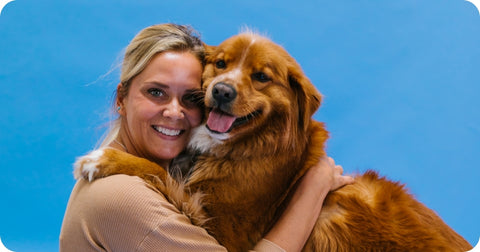
You fondly call human hair the crowning glory. It enhances the overall appearance of a person. Same with pets, their coat and skin both have vital roles in their general condition and appearance.
They have roles to play in the immune system and in staying hydrated. Look at some of the following functions of dogs' skin and coat:
Dog's skin and pet hair serve as security
Your dog's skin serves as protection against any harmful objects or any stressors. As much as they work as barriers, they also safeguard internal organs from pain and pressure. They also shield the entire body from any possible chemical trauma or possible injuries.
They work to protect their immunity
The dog's coat and skin have essential functions in maintaining the excellent state of their immune system. Without the proper strength of their immunity, there are dangers of infections and any nasty illnesses due to dangerous bacteria. This includes excessive dog shedding or hair loss.
They serve as thermoregulation
Your pet's health also depends on how comfortable they are or shelter whenever the cold season comes. If your dog has a healthy coat, dogs will manage their body temperature because of their layer of fur and skin.
Dogs and other pets can warm themselves through shivering. Hair follicles function when they bring their fur together, and they wrap the entire body. At the same time, this will also push the air to cool them.
They help in hydration
Your dog's skin is crucial in ensuring proper hydration. If the skin does not have enough water, this can considerably affect your dog's health. Dogs lack sweat glands, and if they lose more water by having unhealthy skin. This ends up in a more severe condition. This is called transepidermal water loss. Losing water can also means losing energy, and they need this to catch up on their metabolism.
They serve as storage for needed nutrients
The skin of a dog works wonders. That is why pet owners must well take care of it. It stores several vital nutrients such as amino acids, protein, collagen fibers, and enzymes. Their hair is mostly protein, and a good percentage of their daily protein consumption is to make sure their skin and coat stay healthy.
The skin also stores linoleic acid to make sure it stays flexible and seamless or healthy! That is why fish oil or salmon oil is always a stimulating factor because of its fatty acid content. In addition, it takes care against inflammation.
Another nutrient that the skin stores are Vitamin D by being exposed to the sun. It also takes care of zinc, selenium, and manganese, which are responsible for producing dogs' energy. Manganese in the skin also strengthens proteins and carbohydrates. You can usually find minerals in high densities due to their roles as coenzymes in biological effects in a dog's skin.
Vitamin A in the skin works for growth, immunity, and for producing cells. Vitamin E is an antioxidant that serves as a protector.
What Causes Dog's Excessive Shedding?
In some cases, dogs shed due to infections, parasites, and even stress. Dogs who also suffer from thyroid irregularity may end up having sore skin and crumbly hair, which makes it more difficult to comb since it is very delicate.
Even though no one can stop dogs shedding among our pets, dog owners can control dog shedding and eliminate the possible discomfort they have, and maintain their coat healthy:
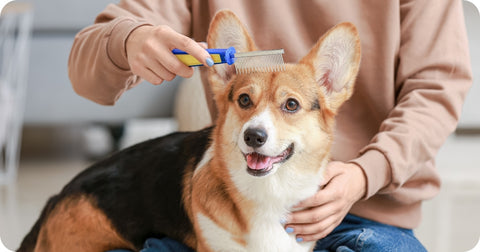
- Brush or stroke your dog's coat. There are different types of hairbrushes. So it pays to know them!

- Brittle brushes are perfect for combing all types of coats. Use long brittles if your dog has a longer coat. Use a solid brush for a shorter coat.
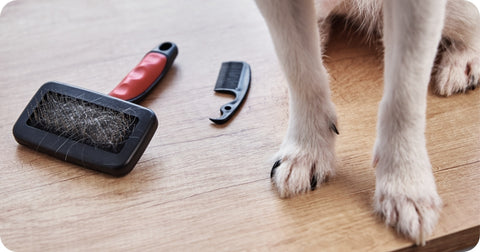
- For dogs with abundant fluffy, loose hair, choose wire-pin hairbrushes for removing the tangles.
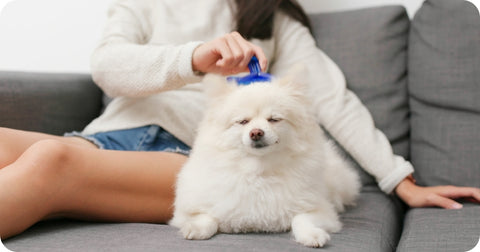
- For the total zen experience, pet owners can use rubber curry combs. It readjusts to short-haired breeds and is suitable for massaging their skin. This also helps eliminate dander and old hair. Everyone, including your dogs, loves massages.
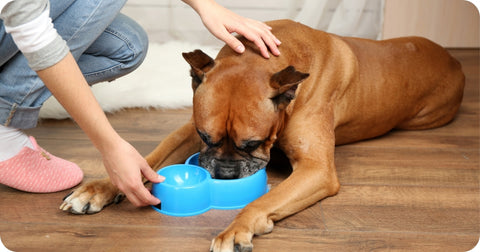
- Always hydrate your dogs. You may think, of course, this is a very trivial thing to do. But many dog owners always neglect to hydrate their pets. So if your dog shows signs of dry mouth, gasping, does not want to eat, is depressed, and excessive shedding, give them clean water right away or any drink that would energize them.
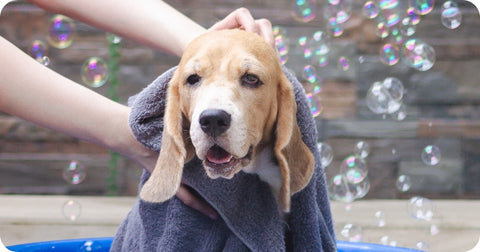
- Bathe them regularly. Regular cleaning can remove excess hair. You can bathe them every other week. Use a shampoo that is oatmeal-based as this helps in excessive shedding of dog hair. If you notice mats soak, then use a detangler. Finally, brush their coat until a lot of dog hair has come out.
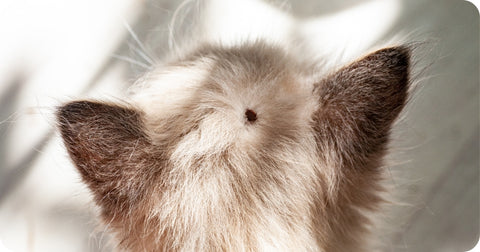
- Always Check for Ticks and Fleas. There is no doubt that mites can affect pet health. Because of fleas and ticks, they can have rashes that end in thinning spots and sore skin. You can use flea spray or flea repelling spray at home.
Is Shedding Painful for Dogs?

Dog's shedding could create an uncomfortable experience. Sometimes, it causes dogs to scratch their skin, and this could lead to dog skin irritations. This is where help, such as feeding fish oil to your dogs, comes in handy. It can ease their discomfort because of sore or dry skin. In addition, fish oil contains EPA and DHA, and other omega 3 fatty acids that could appease the scratching caused by dog shedding.
Your trusted veterinarians can attest to how fish oil can also prevent the dog from shedding too much. How does this happen? By comforting them and avoid scratching more their skin. In general, you can give 1,000 mg for every 30 pounds of your dog's body weight.
If this is for a more grievous medical condition, you can increase the dosage to 1,000 mg for every 10 pounds of your dog's body weight. Try our dosage calculator to have a better idea, or talk to veterinarians for a professional medical recommendation.
Salmon oil is one type of fish oil known for having a vast source of omega 3 fatty acids. The components that make the difference are eicosapentaenoic acid (EPA) and docosahexaenoic acid (DHA). Adding this to your dog's regular diet will help relieve and lessen the risk of heart illnesses, enhance their brain functions, and decrease inflammation.
What Are the Benefits of Giving Salmon Oil to Help Dogs Have a Healthy Hair/Coat?
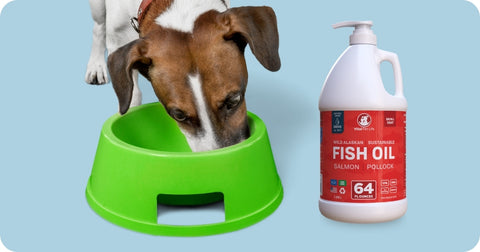
- Salmon oil is not difficult to add to your dog's diet
- It can help in maintaining the correct weight of your dogs
- Protects your pets from dry skin
- It helps promote a clear vision
- Has big chances of promoting brain health
- It may assist in fetal growth
- It improves your dog's blood flow
- It helps in maintaining a healthy dog's coat type
- It shows changes in your dog's hair, making it shinier and smoother
What Can You Learn From This Article?

Dogs shed as part of their life cycle. It is natural to get rid of the unnecessary and damaged hair to make way for the better one to protect the undercoat. Many dog breeds grow thick fur as winter comes and then shed them in the spring to help them manage body temperature.
Fish Oil For Dogs
One can control dog shedding if you notice this happens more than it usually should. There are many methods to avoid this and to help your dog in difficult times of excessive shedding. If you need help in maintaining your dog's coat and skin, Vital Pet Life is your lifeline and a best friend just waiting for your dog stories on the other line! We offer sustainable and MSC certified fish oil and Salmon Oil that will help to improve your pet's skin and coats. Get help from us or contact us to tell us how you are enjoying being a fur parent!
Recommended reading: What Helps Dog Shedding?
